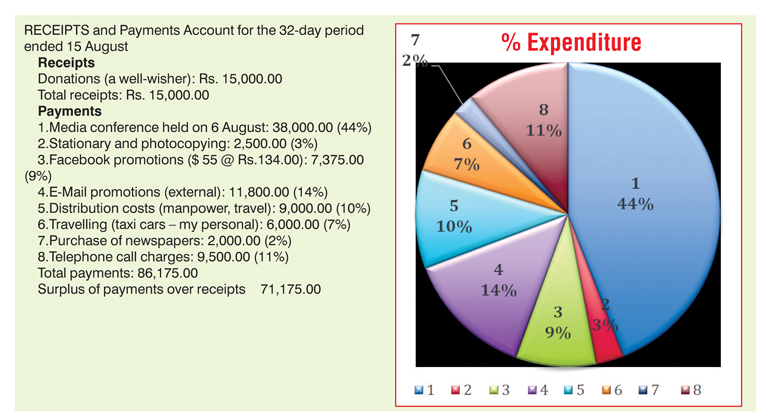Wednesday Feb 25, 2026
Wednesday Feb 25, 2026
Thursday, 3 September 2015 00:00 - - {{hitsCtrl.values.hits}}

Independent candidate Dr. Ajith Perera has voluntarily declared his campaign expenditure breakdown
By Dr. Ajith C. S. Perera
An independent Commonwealth Observer Group was invited by the Office of the Commissioner of Elections of Sri Lanka to observe the country’s Parliamentary elections on 17 August.
The nine-person observer team, selected by Commonwealth Secretary-General Kamalesh Sharma, was led by former President of Malta Dr George Abela.
One of Dr. Abela’s key findings was that the disparity of campaign financing impacts significantly on a democratic political system. This issue had been highlighted by several election monitors of his team.
Dr Abela issued certain statements as part of Observer Group’s preliminary report at a press conference held in Colombo on 19 August following the conclusion of their mission here.
Two crucial statements
by Dr. Abela

(i). “There are currently no regulations on campaign spending or campaign financing.”
(ii). “Print and electronic media are heavily relied on for campaign messaging. This puts candidates with more limited financial resources at a disadvantage.”
Q: Dr. Ajith Perera, you were a first time contestant at Parliamentary elections in Sri Lanka?
A: Yes I was a first time contestant, on behalf of the largest minority of citizens – near 20% of the population who for different reasons are experiencing restrictions in our abilities to move, grasp, see and hear. Neither I nor others who stood on a similar platform had previous experiences in contesting any elections. Every one of us who contested also has some restricted abilities.
Q: What are your first impressions about the need and importance of money in contesting elections?
A: We did realise the need for funds and financial support. Since being unexpectedly thrust at the very last minute into this election fray we had just 30 days to attend to all matters.
We had the first ‘M’, the Merit, in abundance – education, honesty and integrity, subject knowledge, senior administrative experiences, etc., together with commitment.
But we all failed at the second ‘M’, the Money hurdle.

Q: What were your experiences in getting the electronic media to take your messages out loud and clear to the voters?
A: Almost all radio and television stations indicated that airtime to take out our messages could be afforded only for those who had placed ‘paid advertisements’ with them. The millions of rupees thus needed were beyond our individual means. We were also not able to get the justified intervention by the Election Commissioner to directing these electronic media institutions to afford us too equal opportunity.
Q: Were there any other instances where you felt you were disadvantaged due to the money factor?
A: We also realised that contestants from mainstream political parties, including those who got a National List opportunity, needed to support political parties financially. In the Colombo and Gampaha Districts where we contested, money was a far more forceful and vote pulling than merit.
Q: Do you agree with the observations made by this Election Monitoring Panel concerning the election finance disparity amongst candidates?
A: Soon we recognised that almost at all important stages of the campaign we were marginalised mainly by campaign finance disparity. Our lack of spending power drastically restricted us reaching 70% of voters. Hence the experience we have had and the challenges we have met as first time contestants fully bear out the observations made by Dr. Abela’s team of independent election monitors.
Q: Dr. Abela has made some recommendations as a remedial measure. What suggestions you would like to add here?
A: The re-elected Prime Minister Wickremesinghe, after a lengthy dialogue with President Sirisena, in his message to the nation has emphasised building a better new Sri Lanka and that he will deliver on the promise of equality, social justice and democracy. As the Prime Minister has assured, we are now in an era of promise-keeping and NOT just promise-making. Setting limitations on election campaigning thus becomes important as the campaign financing disparity among candidates tends to be a major hindrance to democracy.
We believe the new Sirisena-Wickremesinghe ‘Yahapaalanaya’ will take serious note of these remarks of Dr. George Abela and soon implement effective remedial steps concerning election finance reforms in the 20A.
Q: Finally, although seniors in politics in Sri Lanka are yet to follow suit, have you thought of declaring a detailed breakdown of the election campaign expenditure you incurred?
A: Although I am not a financial expert, already and totally voluntarily, I have declared a detailed breakdown of my election campaign expenditure I have incurred. The main expenditure in my campaign for our two independent groups that contested from Colombo and Gampaha was for organising a media conference at Galadari Hotel.
Total expense of Rs. 71,175 was borne personally by me and paid for with my limited personal savings. With the kind of spending power we could afford, all we could wish for, as Dr Abela recommends, is appropriate election financial reforms are brought through 20A.
In the absence of enforcement of appropriate regulations on campaign spending or campaign financing, none of us could ever get the desired television and radio exposure. This means we will again find drastically restricted unable to reach a good 70-75% of voters who will thus be ignorant about our vision, mission and plans of action. This again is a threat to democracy, equal opportunity and social justice.